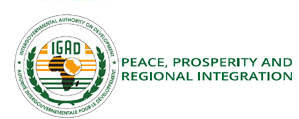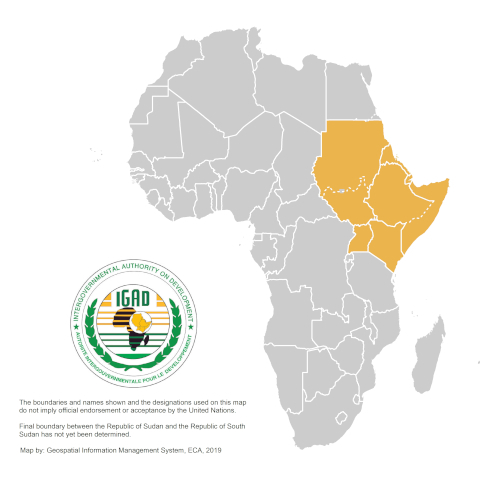IGAD - Intergovernmental Authority on Development

The Intergovernmental Authority on Development (IGAD) was created in 1996 to succeed the Intergovernmental Authority on Drought and Development that was founded in 1986 to deal with issues related to drought and desertification in the Horn Africa. IGAD came to existence with a new name, organizational structure and a revitalized ambition of expanded cooperation among its member States. The mission of IGAD is to assist and complement the efforts of the member States to achieve, through increased cooperation: food security and environmental protection, peace and security, and economic cooperation and integration in the region. The objectives of IGAD are to:
- Promote joint development strategies and gradually harmonize macroeconomic policies and programmes in the social, technological and scientific fields.
- Harmonize policies with regard to trade, customs, transport, communications, agriculture, and natural resources, and promote free movement of goods, services and people within the region.
- Create an enabling environment for foreign, cross-border and domestic trade and investments.
- Achieve regional food security and encourage and assist efforts of member States to collectively combat drought and other natural and man-made disasters and their natural consequences.
- Initiate and promote programmes and projects for sustainable development of natural resources and environment protection.
- Develop and improve a coordinated and complementary infrastructure, in the areas of transport, telecommunications and energy in the region.
- Promote peace and stability in the region and create mechanisms within the region for the prevention, management and resolution of inter-State and intra-State conflicts through dialogue.
- Mobilize resources for the implementation of emergency, short-term, medium-term and long-term programmes within the framework of regional cooperation.
- Promote and realize the objectives of the Common Market for Eastern and Southern Africa (COMESA) and the African Economic Community.
- Facilitate, promote and strengthen cooperation in research development and application in science and technology.
The operational structure of IGAD is composed of four hierarchical policy organs. These are:
- Assembly of Heads of State and Government
- Council of Ministers
- Committee of Ambassadors
- Secretariat
The member States of IGAD are: Djibouti, Ethiopia, Eritrea, Kenya, Somalia, the Sudan, South Sudan and Uganda.

Selected regional indicators for IGAD (2014)[1] | |
GDP | $218.2 billion |
GDP per capita | $874 |
Area (sq. km) | 5.5 million sq. km |
Total population | 247.4 million |
Total imports | $55.9 billion |
Total exports | $18.2 billion |
Source: United Nations Conference on Trade and Development, statistical database[1]
The headquarters of IGAD
IGAD Secretariat
Avenue Georges Clemenceau
P.O. Box 2653 Djibouti
Republic of Djibouti
Tel: +253-21354050
Fax: +253-21356994
E-mail: info@igad.int
Web: http://www.igad.int/